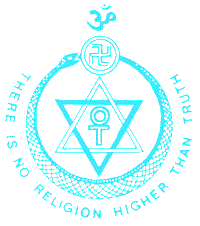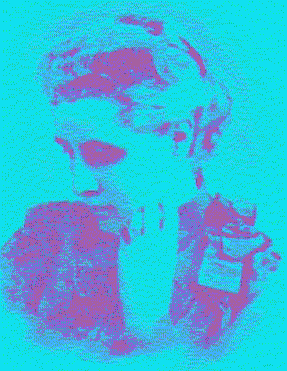KARMA

A Study in Karma
by
Annie Besant
Published in 1917

Laws:
Natural and Man-Made
Much confusion has arisen in this matter, because, in
the West, "natural" laws have been regarded as apart from mental and
moral laws, whereas mental and moral laws are as much part of natural law as
the laws of electricity, and all laws are part of the order of nature. Natural
law has been, in many minds, confused with human law, and the arbitrariness of
human legislation has been imported into the realm of natural law. Laws
affecting physical phenomena have been rescued from this arbitrariness by
science, but the mental and moral worlds are still in the chaos of lawlessness.
Not a divine command, but the immanence of the divine
nature, conditions our existence, and where prophets have laid down moral laws,
these have been declarations of inevitable sequences in the moral world, known
to the prophet, unknown to his ignorant hearers; because of their ignorance,
his hearers have regarded his declarations as arbitrary commands of a divine
lawgiver, sent through him, instead of as mere statements of fact concerning
the succession of moral phenomena in a region as orderly as the physical.
Law, in the secondary social sense, is an enactment
laid down by an authority regarded as legitimate. It may be the edict of an
autocrat, or the act of a legislative assembly; in either case the force of the
law depends on the recognition of the authority which makes it. Among the
Hindus we find the ideas both of man-made and natural law. The King, in the
conception of the Manu, is an autocrat, and the subject must obey; but above
the King is a Law to which he in his turn must be obedient, a Law which acts
automatically and is in the nature of things. In spite of his autocracy, he is
bound by the supreme Law, which will
crush him if he disregards it. Weakness oppressed is
said to be the most fatal enemy of Kings; the tears of the weak sap the
foundation of thrones, and the suffering of the nation destroys the ruler.
The physical and the super-physical worlds
interpenetrate each other, and causes set going in the one bring about results
in the other. The King and his Council in ancient
natural law.
It seems a pity that one word should be used for two
things so different as natural and artificial laws, yet they are clearly
distinguishable by their characteristics. Artificial laws are changeable; those
who make them can alter them or repeal them. Natural laws are unchanging; they
cannot be altered nor repealed, but lie in the nature of things. Artificial
laws are
local, while natural are universal. The law in any
country against robbery may be enforced by any penalty chosen by the
legislator; sometimes the hand is cut off, sometimes the thief is sent to goal,
sometimes he is hanged. Moreover, the infliction of the penalty is dependent on
the discovery of the crime. A penalty
which is variable and artificial, and which may be
escaped, is obviously not causally related to the crime it punishes. A natural
law has no penalty, but one condition follows invariably on another; if a man
steals, his nature becomes more thievish, the tendency to dishonesty is
increased, and the difficulty of
being honest becomes greater; this consequence works
in every case, in all countries; and the knowledge or ignorance of others as to
theft makes no difference in the consequence. A penalty which is local,
variable and escapable is a sign that the law is artificial, and not natural. A
natural law is a sequence of conditions; such a condition being present, such
another condition will invariably fellow. If you want to bring about condition
No.2, you must find or make condition No.1, and then condition No.2 will follow
as an invariable consequence. These sequences never vary when left to
themselves, but if a new
condition is introduced the succeeding condition will
be altered.
Thus water runs down a slanting channel in accordance
with the force of gravitation, and if you pour water in at the top, it will
invariably run down the slope; but you can obstruct the flow by putting an
obstacle in the way, and then the resistance which the obstacle opposes to the
force of gravitation balances it, but the force of gravitation remains active
and is found in the pressure on the obstacle.
The first condition is called the cause, the resulting
condition the
effect, and the same cause always brings about the
same effect, provided no other cause is introduced; in the latter case, the
effect is the resultant of both.
______________________
KARMA

Find out more about
Theosophy with these links

The Cardiff Theosophical Society Website
The
National Wales Theosophy Website
If you run a Theosophy Group, please feel free
to use any of the material on this site
The Most Basic Theosophy
Website in the Universe
A quick overview of Theosophy
and the Theosophical Society
If you run a Theosophy Group you
can use this as an introductory handout.
Theosophy Cardiff’s Instant Guide
One liners and quick explanations
H P Blavatsky is
usually the only
Theosophist that
most people have ever
heard of. Let’s
put that right
The Voice of the Silence Website
An Independent Theosophical Republic
Links to Free Online Theosophy
Study Resources; Courses, Writings,
The main criteria
for the inclusion of
links on this
site is that they have some
relationship
(however tenuous) to Theosophy
and are
lightweight, amusing or entertaining.
Topics include
Quantum Theory and Socks,
Dick Dastardly and Legendary Blues Singers.
A selection of articles
on Reincarnation
Provided in
response to the large
number of
enquiries we receive at
Cardiff
Theosophical Society on this subject
The Voice of the Silence Website
This is for
everyone, you don’t have to live
in Wales to make
good use of this Website
No Aardvarks were harmed in the
The Spiritual Home of Urban Theosophy
The Earth Base for Evolutionary Theosophy
A B C D EFG H IJ KL M N OP QR S T UV WXYZ
Complete Theosophical Glossary in Plain Text Format
1.22MB
________________
Preface
Theosophy and the Masters General Principles
The Earth Chain Body and Astral Body Kama – Desire
Manas Of Reincarnation Reincarnation Continued
Karma Kama Loka
Devachan
Cycles
Arguments Supporting Reincarnation
Differentiation Of Species Missing Links
Psychic Laws, Forces, and Phenomena
Psychic Phenomena and Spiritualism
Quick Explanations with Links
to More Detailed Info
What is Theosophy ? Theosophy Defined (More Detail)
Three Fundamental Propositions Key Concepts of Theosophy
Cosmogenesis
Anthropogenesis
Root Races
Karma
Ascended Masters After Death States Reincarnation
The Seven Principles of Man Helena Petrovna Blavatsky
Colonel Henry Steel Olcott William Quan Judge
The Start of the Theosophical Society
History of the Theosophical Society
Theosophical Society Presidents
History of the Theosophical Society in Wales
The Three Objectives of the Theosophical Society
Explanation of the Theosophical Society Emblem
Glossaries of Theosophical Terms
An Outstanding
Introduction to Theosophy
By a student of
Katherine Tingley
Elementary Theosophy Who is the Man? Body and Soul
Body, Soul and Spirit Reincarnation Karma
Try these if you are looking for a local
Theosophy Group or Centre
UK Listing of Theosophical Groups